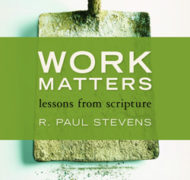Book Review: Work Matters, Lessons from Scripture by R. Paul Stevens
Blog / Produced by The High Calling
From the time I awake to the sound of the alarm on my phone, my life seems to be centered not just around technology, but entertainment. There's the radio app on my phone, the constant temptations while at work, glued to my computer but with Facebook or YouTube just a click away. Furthermore, how many of our working hours, our job descriptions themselves, depend upon the desire for entertainment?
The life of the biblical writers was much different. It may go without saying that entertainment did not factor into the life of the common worker. Theirs was a life of working the ground for survival. Yet their stories can have such a great impact on our lives today—no matter whether we emulate them more literally in trades that require physical labor, or if we spend our time exerting ourselves in an office setting.
In the book Work Matters: lessons from scripture, R. Paul Stevens takes the reader on a journey throughout the Hebrew Scriptures and the New Testament, bringing to life the lessons from the many workers found in the Bible. In all, Stevens profiles more than twenty biblical accounts and portrays the very nature of their work as an expression of God's plan for the world. In this review, I will highlight just a few of the stories that I found most meaningful.
Naturally, Stevens begins with Adam and Eve. While much has been written about the command to have dominion over the Earth, in this book he looks deeper.
Covenant contrasts with contract. A contract is an agreement to exchange goods and services upon some predetermined terms. A covenant is essentially relational. So the meaning of God's superlative creativity is that God belongs to what he has made and what he has made belongs to God. The whole of the created order, and of humankind in particular, is an expression of the imagination of God... Instead of work being, as is often said, part of the "creation mandate" to take care of the earth, work is part of the covenant mandate. It is part of what it means to belong to God, to honor God, and to invest in God's purposes. Work is not a human invention. It is a divine calling and a way of imitating and resembling our creator.
One of my favorite stories in the Bible is that of Joseph. His story has more twists and turns than any rollercoaster.
First, Joseph has a career. For the first seventeen years of his life (from privilege to the pit), he follows in his father's steps as a shepherd...Then Joseph gets a job (this is the period from the pit to the prison), working as a slave in Potiphar's household....But when Joseph is elevated from the prison to the palace, he discovers a vocation, a calling.
Perhaps Joseph's calling all along was that of caretaker. As a leader in Egypt, he became a caretaker for not just a flock, or a household, or even just the nation of Egypt. He became a protector for all the people of the land, including his own family.
The final and most striking summons arising from this book is the question the author poses in its final chapters:
What kind of work done for Christ is it that will last? The popularly understood answer to that question is that only overtly Christian work, such as evanglism or Bible teaching, will last. But can that be true? What about other kinds of work? Moreover, it is not just Christians who ask whether our life's work has enduring value.
As I continued to meditate on this question, I began to see how it is not occupations in and of themselves that have lasting value. It is a matter of centering our whole life on God—so that no matter what our work, we are empowered to act with integrity for lasting impact. Work that will last honors what God values, namely relationships, and continues to build character in ourselves and acts in service to others.
As Stevens says,
We all have a vocation, a calling, which is much more than a career; it is the empowering summons of God to participate in the grand plan of renewing everything.





